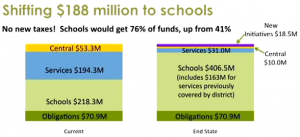What They’re Saying About A Plan To Overhaul Indianapolis Public Schools

Kyle Stokes / StateImpact Indiana
The Indianapolis Public Schools board meets in August. Superintendent Eugene White (pink tie at center) is presiding over the meeting.
For a “conversation starter,” the proposal The Mind Trust released Sunday sure is explosive.
The 154-page report proposes gutting the Indianapolis Public Schools’ administrative budget, dissolving the locally-elected school board in favor of mayoral control, and giving IPS schools freedom to set their own budgets and curricula.
Agree or disagree, it’s possible the report could have a nationwide ripple effect as political and education leaders look for ways to revamp urban public schools. Then again, it’s also possible the report simply rehashes old ideas.
Mind Trust co-founder and CEO David Harris summarizes the report in this video:
The Mind Trust is the brainchild (pun intended?) of several political heavy hitters: Indianapolis’s former Democratic mayor Bart Peterson joined with Harris, who worked in the administration of Democratic governor Evan Bayh, to found the organization in 2006.

Screenshot/Mind Trust
The Mind Trust's report proposes nearly doubling the amount of Indianapolis Public Schools funding that goes directly to district schools. It also proposes significant cuts in the district's administrative budget, as shown in this graphic from a video The Mind Trust released with the report.
The group’s Board of Directors includes several other big names, including former NBC anchor Jane Pauley and TIME magazine education writer Andrew Rotherham. (On his blog, EduWonk, Rotherham called the report “significant.”)
One potential model for IPS’s turnaround, the report’s authors write, is the school system in post-Katrina New Orleans.
By many accounts, schools in New Orleans’ Recovery School District — dominated by charter schools or “schools of choice” — have seen significant improvements in test scores and a narrowing of the achievement gap. As NPR correspondent Larry Abramson has reported, though, the new system has created problems of access for some students.
Reactions started rolling in almost immediately after the report’s release.
From Indy Star columnist Matthew Tully:
Here’s my Christmas wish: It’s that the new Mind Trust report that calls for a sweeping overhaul of the way Indianapolis Public Schools operates will not turn into another tired battle over turf, pride and special interests. Instead, my hope is that it will lead to a broad and much-needed communitywide discussion about the future of the state’s largest, and in some ways most important, school district…
This isn’t a slam on the leaders within IPS. It’s simply an acknowledgment that even the greatest leaders would stumble under the bulky bureaucracy that has been built up over decades.
From Advance Indiana:
Notice that the driving principle here is that spending more per student leads to better schools, a demonstrably untrue claim that has been proven over and over again over the past several decades of our declining public school systems.
There is nothing novel about the Mind Trust proposal to hand control of a major city’s public school system to the mayor. It has been done in Chicago, Boston and other major cities with less than successful results…
If we really wanted to improve IPS, we would end teacher tenure to make it easier to get rid of bad, non-performing teachers, and we would break the school system up into much smaller community school systems with board members elected from those neighborhood schools.
From Indiana Barrister:
I like the part about blowing up the bureaucracy in the central office at IPS and redirecting those funds toward the individual schools. I have some questions about how this would work with the existing governance of Charter schools, however, this shows a thoughtful approach to dealing with education. If anything, it is a very good starting point for a thoughtful debate.
Well, if this doesn’t seem like “a starting point for thoughtful debate” in our comments section — what are your reactions?
